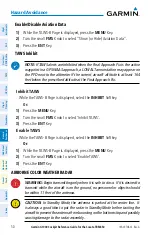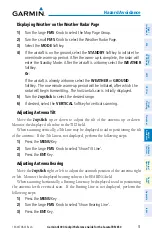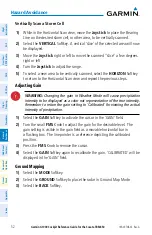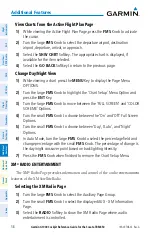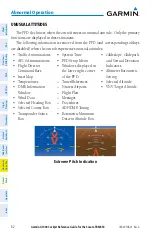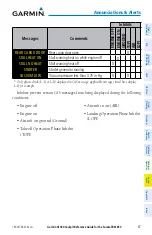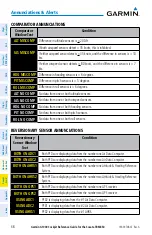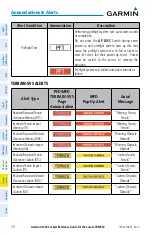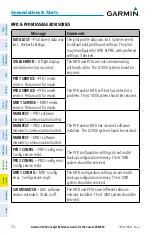
Garmin G1000 Cockpit Reference Guide for the Socata TBM 850
190-00708-02 Rev. A
63
Abnormal operation
Flight
Instruments
EAS
Nav/Com/
XPDR/Audio
AFCS
GPS Nav
Flight
Planning
Pr
ocedur
es
Hazar
d
Avoidance
Additional
Featur
es
Abnormal
Oper
ation
Annun/
Alerts
Appendix
Index
deAd reCkoning
While in Enroute or Oceanic phase of flight, if the G1000 detects an invalid GPS
solution or is unable to calculate a GPS position, the system automatically reverts to
Dead Reckoning (DR) Mode. In DR Mode, the G1000 uses its last-known position
combined with continuously updated airspeed and heading data (when available) to
calculate and display the aircraft’s current estimated position.
NOTE:
Dead Reckoning Mode only functions in Enroute (ENR) or Oceanic
(OCN) phase of flight. In all other phases, an invalid GPS solution produces
a “NO GPS POSITION” annunciation on the map and the G1000 stops
navigating in GPS Mode.
DR Mode is indicated on the G1000 by the appearance of the letters ‘DR’
superimposed in yellow over the ‘own aircraft’ symbol as shown in the following
figure. In addition, ‘DR’ is prominently displayed, also in yellow, on the hSI slightly
above and to the right of the aircraft symbol on the CDI as shown in the following
figure. The cDI deviation bar is displayed in yellow, but will be removed from the
display after 20 minutes. Lastly, but at the same time, a ‘GPS NAV LOST’ alert message
appears on the PFD.
Normal navigation using GPS/WAAS source data resumes automatically once a
valid GPS solution is restored.
It is important to note that estimated navigation data supplied by the G1000 in
DR Mode may become increasingly unreliable and must not be used as a sole means
of navigation. If, while in DR Mode, airspeed and/or heading data is also lost or
not available, the DR function is not be capable of estimating your position and,
consequently, the system may display a path that is different than the actual movement
of the aircraft. Estimated position information displayed by the G1000 through
DR while there is no heading and/or airspeed data available should not be used for
navigation
.
DR Mode is inherently less accurate than the standard GPS/WAAS Mode due to the
lack of satellite measurements needed to determine a position. Changes in wind speed
and/or wind direction compounds the relative inaccuracy of DR Mode. Because of this
degraded accuracy, the crew must maintain position awareness using other navigation
equipment until GPS-derived position data is restored.
Summary of Contents for SOCATA TBM850
Page 1: ...G1000 Integrated Flight Deck Cockpit Reference Guide System Software 0719 06 or later...
Page 2: ......
Page 4: ......
Page 121: ......


